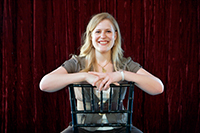 Bravo! Bravo!
Bravo! Bravo! Rebekah Johnson, public relations coordinator for the Michigan Opera Theatre, is staging a program to open the curtains on a younger crowd's appreciation of music and libretto.
Post 3 - Detroit, the Opera: Act III
Posted By: Rebekah Johnson
Posted: 6/12/2010
Helping young people get past the fat ladies and horns
"I don't know about opera...isn't that for snobby old rich people?" is a comment I often hear when talking to young professionals about the art form.
There are many misconceptions about opera: that you won't be able to understand it; that only old people go to opera; that opera won't be relevant to you; that it's too expensive. The truth is that opera is understandable with supertitle translation in English above the stage, just like a foreign film. Young people go to the opera in Detroit all the time. Opera plots are just as timeless now as they were two hundred years ago. And it doesn't have to be expensive.
When I began working at Michigan Opera Theatre three and a half years ago, I knew there was a need to break down these barriers in young people's minds about opera. We knew our audience was aging but there was no existing strategy to introduce and demystify opera to young adults. Engaging younger people as new classical music lovers is notoriously difficult to do and there is no proven method to succeed in reaching these new audiences. But something needed to be done. So in February 2008 I called a meeting with some of the employees at the opera house who expressed an interest in the project and we brainstormed ideas to get younger people into the opera, especially those who may never have attended before.
Over several months we developed a program called Access, a discounted ticket program for young professionals and students for opera, held on the Wednesday night performance of each production. Each Access ticket would include a drink ticket and hors d'oeuvres after the performance with the opportunity to mingle with the artists and other young professionals.
Our first official Access.Opera event took place in October 2008 for Margaret Garner. While our goal was only to meet and maintain a small group of 30 young professionals and students, over 75 people attended the first performance and over 120 purchased tickets to the second Access.Opera event for Madame Butterfly. Due to the success of our opera program during that fall, we were soon able to open up our dance season to young professionals and students in the same way. Our first Access.Dance event for Alvin Ailey American Dance Theater sold out completely, selling over 200 tickets (200 is an Access sellout due to space capacity). Our first year of the program sold over 800 tickets to young professionals and students, most of whom had never been to an opera or ballet before.
Our second season of Access in the fall of 2009 was met with greater anticipation. News about the success of the program soon reached Jan Stevenson, a good friend of MOT and publisher of Between the Lines. Shortly after, Between the Lines signed on as a media sponsor and brought along Comerica Bank as a reception sponsor. In spring 2010, MOT also received a two-year commitment from The Community Foundation for Southeast Michigan. The second season, which just recently completed, met our goals once again, selling over 800 tickets during the 2009-10 season.
The receptions after Access performances became fun gatherings where our young artists could connect with students from local universities, and where Broadway stars like Leslie Uggams can pull up to the bar for a drink with someone completely new to opera. Even Russian dancers, although hindered by a language barrier, can communicate with young professionals curious about how exhausting their performance was.
Out of all the people that I've met at the receptions following an Access performance, about 98 percent of them are surprised at how much they enjoyed the opera or ballet. I often hear "it's not what I thought it would be. I really enjoyed it." Access has become a wonderful avenue to change someone's perceptions about what an opera singer looks and sounds like. First-time opera goers begin to realize, "Maybe I have more in common with an opera singer than I realize. We're the same age. And they're fun and interesting people."
The success of the program has been overwhelming at times, but extremely hopeful - that out of Detroit's difficult situation, young professionals and students are rising up to get involved and try something new. It's a wonderful thing to see! In truth, we still have lots of work to do to change perceptions about opera among young people in this city. Access may be a small victory, but I love to see change, even one person at a time.